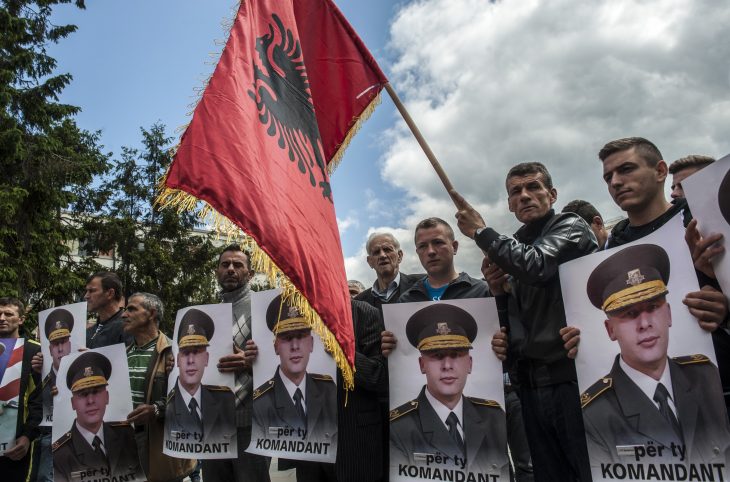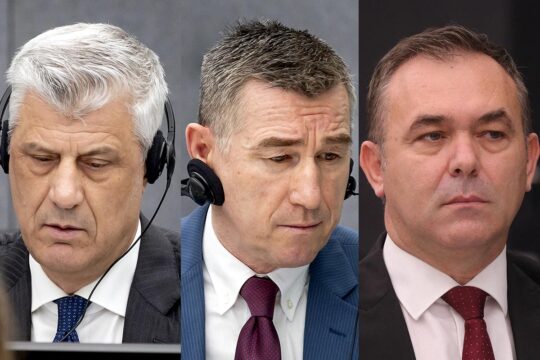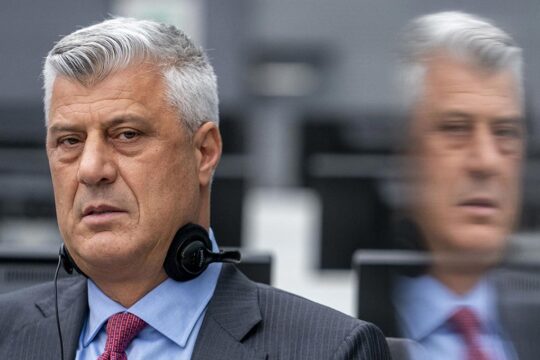The new special court will try to make up for the failures of several international efforts to bring former Kosovo Liberation Army fighters to justice for 1990s crimes, but witness protection, legitimacy and outreach remain key challenges ahead.
After five years of negotiations, the Kosovo Specialist Chambers and Specialist Prosecutor’s Office will finally launch its first judicial activity this year.
Although based in The Hague, the Specialist Chambers (SC) is legally part of Kosovo’s judicial system, but independent from the Kosovo judiciary and staffed by internationals, while all decisions and appointments related to the court will be made by the European Union.
The SC represents a new type of “hybridity” – it is a mix of international and domestic judicial elements; it will mirror Kosovo’s courts, but will have some features usually attributed to international tribunals.
This is not the first time, since the end of the 1998-1999s war, that the international community has tried to prosecute the crimes committed during the conflict.
The crimes committed by both Serbs and Albanians were initially prosecuted by the ad hoc International Criminal Tribunal for the Former Yugoslavia, ICTY, then later by UN-administered local courts and most recently, by the European Union Rule of Law Mission in Kosovo, EULEX, but the results were poor, with fewer than 30 final verdicts.
Therefore, it is not a surprise that the new SC are a sort of legal “fusion” of various elements of all these courts that have operated in the last two decades, but with the attempt to improve the record of its predecessors. However, the court will face serious challenges in securing the safety of the witnesses, legitimacy and outreach. At the same time it will be the first court in Kosovo trying to secure victims participation and reparation mechanism.
Fourth attempt to prosecute
The establishment of the SC comes after the EU’s Task Force in 2014 published the findings of the allegations made by Council of Europe rapporteur Dick Marty, who claimed that crimes against civilians such as kidnapping, torture and organ-harvesting were committed by the members of the Kosovo Liberation Army (KLA) during and after the conflict.
The KLA was an Albanian guerilla group which fought against the repressive Serbian regime and sought independence from what was then Yugoslavia. In 1999, around a million people were expelled from Kosovo, and 13,000 people were killed, most of them Albanians.
NATO intervened on humanitarian grounds in March 1999 and after 78 days Serbian forces withdrew from Kosovo.
Kosovo was put under UN administration and secured by NATO military forces, but they failed to prevent retaliation by Albanians, who in the aftermath killed and expelled many of the remaining Serbs.
At the very beginning of the UNMIK’s work there were initiatives to establish a tribunal – the Kosovo War and Ethnic Crimes Court, but it was dropped due to budget issues, and the existence of the ICTY, which had jurisdiction over the former Yugoslavia.
Although the plan was that the ICTY would focus on the principal perpetrators and local UNMIK courts would deal with lower-level perpetrators, in reality most of the investigations never reached trial or the accused were acquitted due to lack of evidence.
Kosovo adopted the Law on the Specialist Chambers and the Specialist Prosecution Office in 2015, after firm pressure from the EU and US.
According to the law “specialist chambers shall be attached to each level of the court system in Kosovo: the Basic Court of Pristina, the Court of Appeals, the Supreme Court and the Constitutional Court”.
Unlike the ICC complementarity principle, the SC will have primacy over all other courts in Kosovo, as the ICTY once had over local courts in former Yugoslav countries.
All judging panels at all court levels will be composed of three international judges, but they will not be permanent, and will be only called upon when required.
The only permanent judge will be the president of the court, Ekaterina Trendafilova whose experience in tribunals dates back to the time when she was a judge at the ICC.
Something similar already exists with the Mechanism for International Courts, MICT, also a hybrid court established to finish the remaining tasks of the Rwanda and Yugoslavia tribunals. Due to its limited budget and smaller number of cases, a roster of judges called only when needed sounded like a compromise solution.
It is expected that the Kosovo court will not have many cases due to its very limited mandate, as it will only have jurisdiction over crimes that took place between January 1, 1998 and December 31, 2000.
The SC will be able to prosecute crimes against humanity, including murder, extermination, enslavement, deportation, imprisonment, torture, rape, enforced disappearance and other persecution on political, racial, ethnic or religious grounds.
It will also prosecute war crimes and other violations - including the destruction of civilians’ property, towns, villages and religious buildings.
The EULEX later tried to improve on this record, but like with the UN, investigators faced a shield of silence, political pressure and witness intimidation.
Bringing commanders of the KLA before the courts proved to be the toughest job, and prosecutors secured convictions only for their involvement in minor incidents and isolated crimes.
Those in charge of the investigations at the new tribunal claim however that they have managed to reconstruct the pattern of killings, torture, and mass expulsion of civilians that took place during and in the aftermath of the conflict.
They claim they had conducted the most comprehensive investigation so far of crimes perpetrated by the KLA, and as a result they will be in a position to indict high-level perpetrators when the SC starts operating.
Securing Witnesses: Relocated Justice – Better Justice?
But in order to have successful prosecution the new court needs to secure its witnesses. The failure of missions to keep witnesses safe and prosecute war crimes without political interference was one of the key reasons to establish the SC.
The first ICTY prosecutor to speak openly about witness intimidation in Kosovo cases was Carla Del Ponte, who claimed in her book that the witnesses were so afraid that they even feared to talk about the KLA presence in some areas, not to mention actual crimes.
In her memoirs, as well as in her many reports to the UN, Del Ponte said that the intimidation of witnesses seriously affected the verdicts in her cases.
Similar scenario was with the EULEX and its high profile cases. Witnesses changed their testimony during trials, recanting what they said during the investigation phase. The witness protection programme has failed on multiple occasions to provide adequate security and anonymity. Additionally, the witnesses faced the risk of being ostracised by society mostly due to the fact that the KLA members are perceived as heroes and testifying against them an act of treachery.
The new court pledged that the witness protection will be their highest priority and prepared a robust witness protection. The SC will have a Witness Protection and Support Office, which will deal with security arrangements and protective measures for witnesses, as ordered by the judges, but how this will work in practice remains to be seen as the details are still kept in secret. Some argue that it will be a lot easier to secure independence and non-interference if the court is not in Kosovo and the witnesses are far away from home.
Communicating Justice to the Victims
Beside the WPSO, the outreach office will probably have one of the most difficult tasks as the new court is widely seen in Kosovo as an insult to the KLA as a whole, and to its war for freedom. It is also seen as biased because it only focuses on one side of the conflict, namely Kosovo Albanians.
The court is expected to cause serious turmoil on the political scene in Kosovo, as many former leading KLA figures hold official positions and exercise major influence in many areas, including government and business.
What also stirs up rage in Kosovo is the fact that the EU, the key player in administering the former Serbian province, is letting Belgrade get away with its poor record on war crimes prosecutions.
Many observers believe that the EU traded Serbia’s willingness to get around the table with Kosovo at talks in Brussels for a tacit reduction of pressure on Belgrade in areas such as war crimes, which has left many Albanian victims of wartime crimes frustrated at the perceived injustice.
In an atmosphere like this the outreach will probably have one of the hardest jobs the war crime tribunals faced so far and the fact that it was far away from the communities in which the crimes took place made the job of communicating its mission even harder.
What may help is that the SC will have a Victims Participation Office, which is a novelty for courts dealing with war crimes in Kosovo. .
The office will provide assistance to victims who are participating in the criminal proceedings and will manage a list of victims’ counsel, and a system to pay for victims’ representation.
The Victims Participation Office somewhat resembles the ICC’s Trust Fund for Victims and the Office of Public Counsel for the Victims (OPCV) and attempts by modern courts in general to incorporate restorative elements alongside retributive justice. This could be an important element of the new court, bearing in mind that reparation programs are almost non-existent in the Western Balkans.
The court’s success will rest on Albanians and Serbs ready to testify against politically powerful former guerrillas, heroes to many of their kin. But it is also the last chance for the international community to improve its omissions from the past.
The stakes are high, both for Kosovo’s stability and its consolidation as an independent state, and for the witnesses who have come forward. In a way it will also be a test for the new wave of tribunals, the so called specialist chambers, to prove efficient where ICC or other international courts could not.
The writer does the Master of Advances Studies in Transitional Justice, Human Rights and Rule of Law at the University of Geneva and the Graduate Institute, and is the project coordinator at the project “Voices of Resilience” Center for International justice and Accountability.





